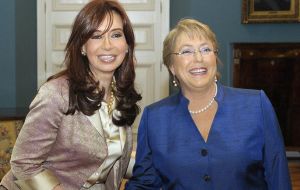MercoPress. South Atlantic News Agency
Argentina Chile plan to bore two integration tunnels under the Andes
 The two ladies at the Chilean government house, Casa de la Moneda
The two ladies at the Chilean government house, Casa de la Moneda Relations between Argentina and Chile are going through an optimum moment and once we drill through the Andes, “ghosts of the past will definitively have gone”, said Argentine president Cristina Fernandez de Kirchner during the first of her two day visit to Chile.
Mrs Kirchner is scheduled to sign Friday with her Chilean peer Michelle Bachelet a “historic” integration and cooperation agreement, an update of the peace and friendship agreement of 1984, originally sponsored by the Vatican, which signalled a radical change in the stormy relations between the neighbouring countries.
The agreement covers a vast range of fields: social security, economics, mining, public works, culture, armed forces and even the construction of two tunnels across the Andes to facilitate road and train communications, trade and interdependency.
“It is the most emblematic public works Argentines and Chileans can jointly address and the day we can drill across that mighty cordillera I think that definitively the ghosts of the past will have gone”, underlined Mrs. Kirchner.
“The treaty we are going to sign tomorrow (Friday) is a historic milestone, the first treaty of its kind between two countries in Latinamerica”, said Chilean leader Ms Bachelet. “Advancing integration can only benefit our peoples and our countries”.
“These barriers (that separate us) are only physical because someone from San Juan (Argentina) speaks more like a Chilean than a citizen from Buenos Aires”, insisted Mrs. Kirchner who travelled for tomorrow’s ceremony with half her cabinet, several governors and members of Congress.
“We have the second longest land border in the world, over 5.000 kilometres and we are going to show our people and the world, that full integration and cooperation to the benefit of both countries is possible”, underlined the Argentine president.
The integration and cooperation treaty to be signed tomorrow is an update of the 1984 version, which was the culmination of peace efforts from the Vatican which started when Pope John Paul II stopped at last minute a war between the two military dictatorships of the time in December 1978.
Arguing an unsolved borders dispute in three inhabited islands in the beagle Channel, extreme south of the continent, where the Atlantic and Pacific oceans meet, the Argentine regime of General Jorge Videla and Admiral Emilio Massera organized a massive attack against Chile then under General Pinochet to take control of the area.
John Paul II implored to both leaders and their Catholic wives and avoided what promised to be a full fledged war. In January 1979 negotiations begun in Montevideo, Uruguay and culminated several years later in the 1984 peace treaty, which a quarter of a century later is being updated and expanded.
The Friday ceremony will also be charged of history and symbolism. The treaty will be signed in Maipu, outskirts of Santiago where in 1818 a joint army of Chileans and Argentines under Bernardo O’Higgins and Jose de San Martín defeated Spanish imperial forces opening the way for the independence of the to be born Chile and Argentina.
The ceremony has a second act, in the Vatican in November when both presidents will jointly visit Pole Benedict for the 25th celebration of the peace treaty. “We will both travel in the same limousine, with the two flags flying, to visit the Holy Father”, said Mrs. Kirchner.




Top Comments
Disclaimer & comment rulesCommenting for this story is now closed.
If you have a Facebook account, become a fan and comment on our Facebook Page!